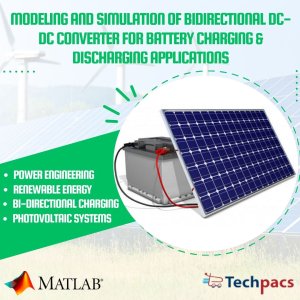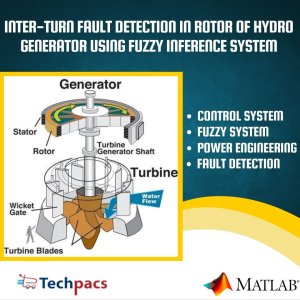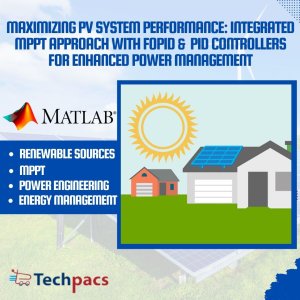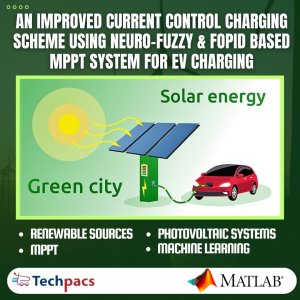Design and Implementation of a Grid-Tied PV System with Battery Energy Storage for Stable Power Output Using Hybrid BESS-PV Algorithm
Problem Definition
The energy consumption per capita in a country is a crucial indicator of its progress and development. However, with the limitations of traditional energy sources becoming apparent, there is a pressing need for more sustainable and reliable technologies to bridge the energy gap and mitigate environmental damage. In particular, the increasing demand for energy combined with the generation gap necessitates the urgent development of innovative solutions. Solar power emerges as a key player in this domain, offering promising opportunities for meeting energy requirements in a sustainable and environmentally friendly manner. Despite its potential, there are significant challenges and limitations in fully harnessing solar power technology to address the energy needs of countries effectively.
These include issues related to efficiency, cost-effectiveness, scalability, and integration with existing energy infrastructure. As such, in order to achieve a successful and impactful transition towards solar energy adoption, these key limitations and pain points must be addressed through focused research and development efforts.
Objective
The objective of the proposed work is to address the intermittent nature of solar power output by developing a grid-tied PV system with a Battery Energy Storage System (BESS). This hybrid system aims to achieve stable and controllable power generation by using Lithium-ion technology for the BESS and specific algorithms for integration with the solar PV power plant. The goal is to overcome challenges related to efficiency, cost-effectiveness, and scalability in harnessing solar power technology, ultimately promoting the use of renewable energy sources for a more sustainable future. Through simulation and design for a residential load in Patiala, India, the project aims to demonstrate the feasibility and effectiveness of this hybrid system in meeting energy needs and bridging the generation gap.
Proposed Work
The proposed work aims to address the problem of intermittent solar power output by developing a grid-tied PV system with a Battery Energy Storage System (BESS). By combining the BESS with a solar PV power plant, the goal is to achieve stable and controllable power generation. The BESS, based on Lithium-ion technology, is connected to the DC bus using a DC-DC power converter, while the hybrid system is connected to the loads through a DC-AC voltage source converter. The use of the System Advisor Model (SAM) software from the National Renewable Energy Laboratory allows for the simulation of results, with the system being designed for a residential load in Patiala, India, based on predefined weather data. The system configuration includes two parallel strings with seven modules per string, along with a DC/AC inverter and a Nickel Manganese Cobalt Oxide battery for energy storage.
By integrating the BESS with the solar PV power plant, the proposed approach aims to overcome the challenges posed by the intermittent nature of solar power output. The choice of Lithium-ion technology for the BESS, along with the use of specific algorithms and simulation software, is driven by the need for stable and controllable power generation. The rationale behind the selection of specific components and technologies is to ensure reliable energy storage and delivery, ultimately contributing to a more sustainable and efficient energy system. Through this project, the objective is to demonstrate the feasibility and effectiveness of the hybrid system in addressing the energy demand and generation gap while promoting the use of renewable energy sources for a more sustainable future.
Application Area for Industry
This project can be utilized in various industrial sectors such as the energy industry, manufacturing sector, and residential buildings. Industries face challenges such as intermittent power supply, high energy costs, and environmental concerns. By implementing the proposed solutions of combining battery energy storage system (BESS) with solar photovoltaic (PV) technology, industries can achieve a stable and controllable power output, reduce energy costs, and minimize reliance on traditional energy sources. This not only helps in meeting energy demands but also contributes to sustainable development and reduces the carbon footprint of the industries. Overall, the benefits of implementing these solutions include improved energy efficiency, lower operational costs, and a cleaner environment.
The hybrid system of BESS and PV technology can be applied across different industrial domains to address specific challenges like reducing peak demand charges, ensuring uninterrupted power supply, and achieving energy independence. For instance, in the manufacturing sector, this solution can help in reducing downtime due to power outages and optimizing energy consumption. In the residential sector, it can lead to lower electricity bills and increased self-sufficiency in terms of energy generation. Furthermore, in the energy industry itself, this project can revolutionize the way energy is stored and utilized, leading to a more sustainable and reliable energy grid. By implementing these solutions, industries can not only enhance their operational efficiency but also contribute towards a greener and more sustainable future.
Application Area for Academics
The proposed project on the integration of Battery Energy Storage System (BESS) with solar photovoltaic (PV) technology can significantly enrich academic research, education, and training in the field of renewable energy systems. This project addresses the critical need for sustainable energy solutions to meet the growing energy demand while minimizing environmental impact.
Academically, this project provides a practical example of integrating BESS with PV systems to enhance power output stability and reliability. Researchers can use the developed code and literature to explore innovative research methods in the design, optimization, and control of hybrid renewable energy systems. This project offers a hands-on approach to understanding the interactions between BESS and PV systems, which can be valuable for teaching renewable energy courses and training future engineers in the field.
The relevance of this project lies in its potential applications for residential, commercial, and industrial energy systems. By simulating the hybrid BESS-PV system using SAM software, researchers can evaluate the performance and economic feasibility of such systems in different locations and under varying weather conditions. This project can also serve as a platform for exploring advanced data analysis techniques to optimize the operation of hybrid energy systems for maximum efficiency and cost-effectiveness.
Specific technology domains covered by this project include lithium-ion battery technology, DC-DC power converters, DC-AC voltage source converters, and modeling tools such as SAM software. Researchers, MTech students, and PhD scholars in the field of renewable energy systems can benefit from the code, algorithms, and simulation results generated by this project for their own research work.
In terms of future scope, this project could be expanded to explore additional energy storage technologies, such as flow batteries or supercapacitors, and to investigate the integration of multiple renewable energy sources for enhanced power system reliability. Further research could focus on optimizing the sizing and configuration of hybrid energy systems for different applications and locations, and on developing advanced control strategies to manage energy flow and ensure system stability. The knowledge and insights gained from this project can contribute to the ongoing efforts towards a more sustainable and resilient energy future.
Algorithms Used
The Hybrid BESS-PV algorithm combines a battery energy storage system (BESS) with a solar photovoltaic (PV) power plant to mitigate solar output intermittencies. The BESS, based on Lithium-ion technology, is connected to the DC bus via a DC-DC power converter, while the hybrid system is connected to the loads by a DC-AC voltage source converter. By utilizing the System Advisor Model (SAM) software from the National Renewable Energy Laboratory (NREL), the algorithm simulates results for residential load purposes in Patiala, India, using predefined weather data. The system is designed with two parallel strings, each consisting of seven modules, and a DC/AC inverter. A Nickel Manganese Cobalt Oxide battery is used for energy storage in the system.
Overall, the Hybrid BESS-PV algorithm aims to achieve stable and controllable power output by integrating BESS and PV technologies.
Keywords
energy usage, social development, economic development, traditional energy sources, environmental damage, reliable technology, sustainable technology, solar power, battery energy storage system, BESS, solar photovoltaic, PV power plant, stable power output, Lithium-ion technology, DC-DC power converter, DC-AC voltage source converter, National Renewable Energy Laboratory, SAM software, residential load, Patiala India, weather data, parallel strings, DC/AC inverter, Nickel Manganese Cobalt Oxide, grid-tied PV system, renewable energy integration, energy management, power electronics, system design, system implementation, energy storage technologies, power control, energy efficiency, grid integration, smart grid.
SEO Tags
energy usage, country development, traditional energy sources, environmental damage, reliable technology, sustainable technology, solar power, battery energy storage system, BESS, solar photovoltaic, solar output intermittencies, hybrid system, Lithium-ion technology, DC-DC power converter, DC-AC voltage source converter, system advisor model, National Renewable Energy Laboratory, residential load, Patiala India, weather data, parallel strings, DC/AC inverter, Nickel Manganese Cobalt Oxide battery, grid-tied PV system, renewable energy integration, energy management, power electronics, system design, system implementation, photovoltaic system, energy storage technologies, power control, energy efficiency, grid integration, smart grid.
| Shipping Cost |
|
No reviews found!

















































No comments found for this product. Be the first to comment!